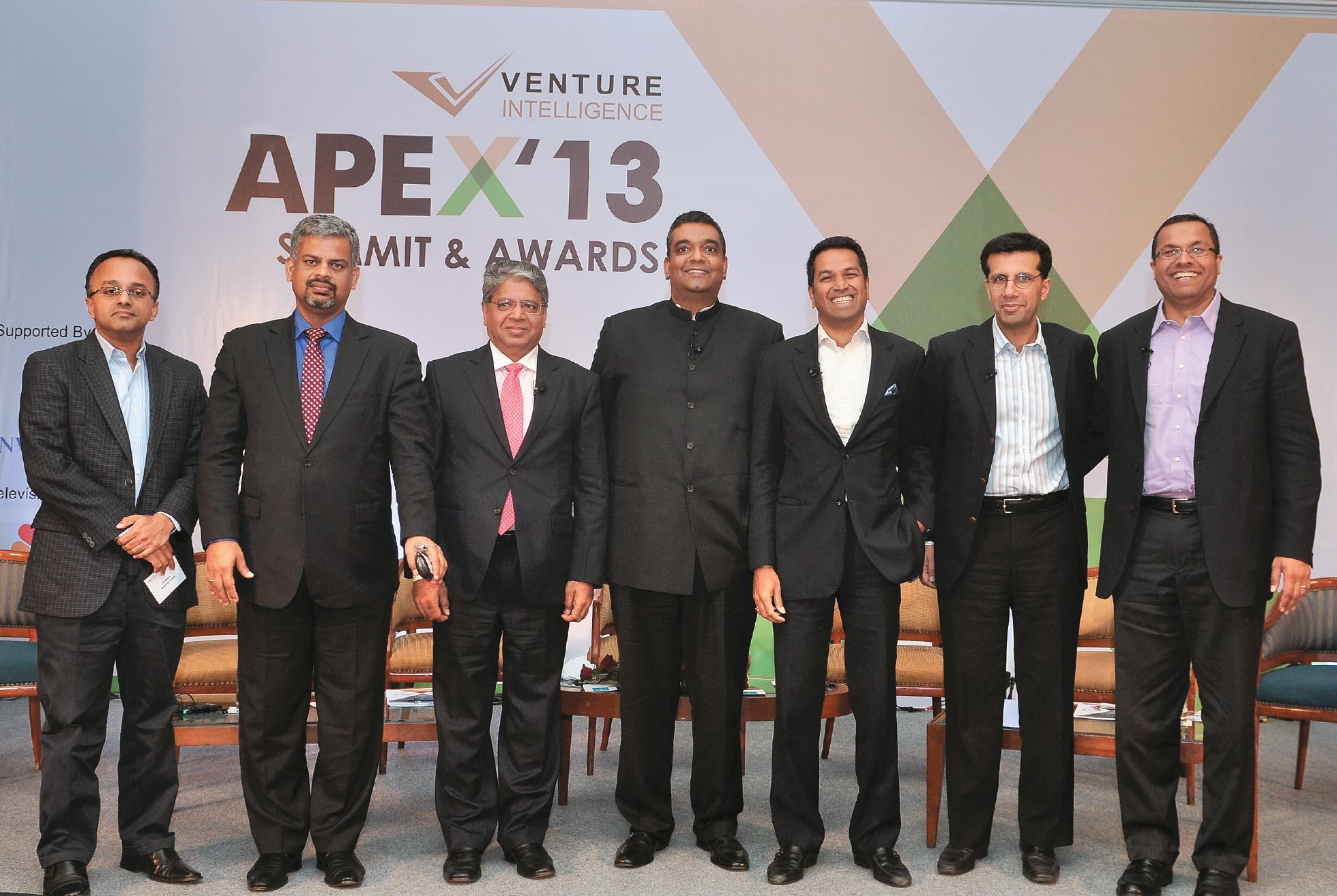The stars were favourably aligned on February 13, 2013 at Mumbai’s Parel, where cotton mills have morphed into swanky high-rises. The event was Venture Intelligence’s annual APEX Summit, where the superstars of private equity got together for a reality check on their industry and to foretell its future. Right from India’s most successful PE investor, Ashish Dhawan, founder, ChrysCapital, to Neeraj Bharadwaj, managing director, Carlyle Asia, Akhil Gupta, senior managing director, Blackstone India, Sandeep Naik, managing director, General Atlantic, Vijay Pattabhiraman, MD & CIO, Asia Infrastructure, JP Morgan and KP Balaraj, co-founder, Westbridge Capital, the roll call couldn’t get any better. The discussion was moderated by Srivatsa Krishna, a 1994 batch IAS officer.
Starting on how the industry has fared so far, Carlyle’s Neeraj Bharadwaj acknowledged that funds haven’t generated the returns expected. “While there have been one-off exits, at a fund level the performance hasn’t been great and the industry hasn’t returned enough capital back,” Bharadwaj said, not before quickly pointing out that Ashish Dhawan was only one in the panel who has managed to generate consistent returns and return capital to his investors.
Adding to it, Akhil Gupta felt that the poor management of the domestic economy in the past two years had impacted the industry. He said, “I still have faith but the most prudent assumptions made about India have turned out to be optimistic.” He believes private equity in India must play the same role venture capitalists played in Silicon Valley, that of helping out with their network and providing guidance to expand the business.
JP Morgan’s Pattabhiraman felt that in the past the industry didn’t do enough fundamental analysis because the market kept marking you up. He also said that India can’t keep playing the demographic card when the execution is poor and basic problems like land acquisition and honouring agreements are still a challenge. Naik of General Atlantic agreed that the days of lazy private equity with too much capital chasing too few deals — on the belief that the market would only move up — were over and the firms will have to work harder operationally to create value along with promoters. Balaraj of Westbridge said that it is important for the industry to have a win-win situation in the future, which has not been the case in the past.
Looking ahead, Dhawan believes the next inflexion point for the industry is still seven to eight years away. While he thinks the tide is turning for the industry, he expects things will be better in the second half of this decade. However in his 13 years of investing experience, Dhawan said corporate governance standards have not improved and in fact have got worse. “If minority investing has to be successful then we need good corporate governance.” He said in most Indian companies, the business is run with the interest of promoters in mind and the voice of the minority investors are not
always respected.
Some of the panellists felt it was unfair to single out India on corporate governance issues, saying it was an issue in all markets including the US. The flipside to that is since India needs to attract capital, there is no option but to improve corporate governance. While the focus in 2013 will be on exits, the panellists felt that it will not be a big-bang year in terms of valuations because bulk of the investments have been in unfancied sectors like real estate and infrastructure. However, Bharadwaj predicted that there will more exits this year because some of the first time funds, which raised money in 2007, will be under pressure to show exits. “We are in the business of returning capital to our investors and if you don’t return capital, you may not be around to play the second innings,” he said.
There was also much talk of policy inaction, regulatory hurdles and ad hoc changes having turned global sentiment against India. There was unanimity that GAAR was the worst thing to happen at a time when India needs foreign capital to cover its deficits. Dhawan felt that if the government goes over the top with regulations, it could destroy the private equity industry. He recalled when he was raising funds in 1999, he had written to TPG’s David Bonderman, who had promptly faxed him a reply by evening saying, “Life is too short to invest in India.”
While most panellists continue betting big on domestic consumption, none of them are giving up on the broader growth story just yet. Bharadwaj voiced the opinion of most private equity investors in India when he said, “I would prefer to invest in a growth market like India any day compared to an economy which grows at 2% because there is a lot more room to create value as investors.”











